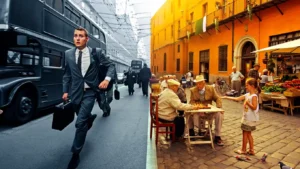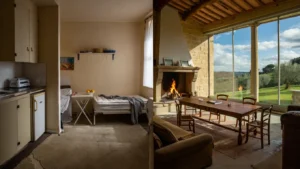Morning all,

I went to my Uncle’s funeral yesterday and was listening to his brother (my other uncle’s speech) as we sat there in the crematorium before his body was burnt.
My uncle (Murly) spoke about what strange several years it’s been…
Counting the deaths we’ve seen…
There’s Les, Matthew’s Dad, my cousin Anita, my two grandparents, Devi my uncle..to be honest, there might be more.
That’s 6 deaths in the last 5 years.
So I wanted to take some time to offer my insights into what to wear to a funeral, as well as what to say.
For most funerals, the traditional attire is black, whether you’re male or – of course.
For the funerals I’ve attended over the last several years – it’s really been no different.
Table of Contents
Funeral Outfit Attire For Men

As mentioned, black is a theme that seems to be traditional from what I know of when it comes to funerals that follow older tradition – but I’m seeing this change more and more.
Whilst wearing black dress shoes, and a black fitted suit if you’re a man, along with a handkerchief being a traditional approach…
I’ve seen multiple variations in the last several funerals I’ve attended (albeit granted with my family) – that make me think this tradition is changing.
At the funeral that I went to yesterday – I saw multiple men in light blue suits, smart trousers, and a jumper (myself). I saw grey suits of many variations, and black trousers and black shirts…
To be honest for the most part I saw less black than I did actual black.
To this end then, I’d say that the universally agreed code of ‘wearing black’ to a funeral seems to be changing to my mind.
I myself actually came in a part of black shoes, the trousers I nicked from my tuxedo (black as well), alongside a black jumper and grey jacket above this.
Most of the men I saw came in suits – and I don’t recall any of them being black either.
With that being said – there did seem to be a couple of rules that WERE being followed – which are as such:
- Nothing overstated in terms of shoes, clothes, or hairstyles
- No bold colours (apart from wearing red which was asked about)
These are the two loose rules I’d say.
To dive into a little bit more detail – I’d say the expectation is that you’re not wearing anything too garish, loud, or bold in a manner that would detract from the main point of the proceedings – to celebrate someone’s life.
It’s pretty much (in a way) the kind of attire you’d wear to a job interview.
Other elements to consider are:
- A white or plain coloured shirt (don’t wear anything with pinstripes or patterns period)
- A subtle/mournful tie – so even with the suggestion of wearing something red to my uncle’s funeral (a colour he liked) – all of the reds were dark and subtle reds rather than anything bold
- If you’re wearing a shirt make sure it’s collared (I wore a jumper which was brave but put a jacket atop of it which made it feel more formal)
- Dark dress shoes (this was uniform – everyone was wearing shoes and black/dark grey shoes at that)
- Dark socks are ideal also (I made the mistake of not wearing the same colour socks which was stupid….but it did get some laughs as it was all my family)
- If you’re wearing a shirt – grab a tie (a shirt minus a tie to a wedding is bold and something I’d avoid)
Now, some of this will bend according to the wishes of the family who are managing the funeral proceedings.
In this case, it would be my cousin’s family and so the dress code was smart casual and I wore a black jumper which landed me some comments, as everyone else seemed to be wearing a suit.
With this in mind, on balance, if you’re wearing ‘non-suit’ options then it’s important to be mindful of your choices and combinations.
A jumper alone is too bare – wear it with a jacket.
Funeral Attire For Women
[[PROTECTED_URL_67fe3e411819699c43b07eb7ec2025fc]] alt=”Attire For Women” width=”851″ height=”207″ />
Thought I’d give this a go since I’ve racked up the funeral attendances that I’ve been to.
Let’s start with the ‘don’t do this’ based upon what I’ve seen at these funerals –
Don’t wear open-toed sandals.
This is actually something I’m yet to see at a funeral – so I’d say this is something of a prerequisite.
Obviously, it applies to men as well, but it (lol) more important for women.
Don’t wear anything on your head other than a fascinator
This actually applies to both men and women, but I’ve lumped it into the female section – that the wearing of hats of any kind minus a fascinator is a no.
I had to google this term to make sure I was thinking of the right thing –

It’s this stuff basically – I’m sure you’ve seen this at least from movies if not in real life.
Wearing something like this I guess is appropriate – but being honest…
I’ve not seen women wear them in any of the funerals I recall attending.
With all of that being said – I’m also British Indian and the funerals I’ve attended have all been for Indian’s so I’m not sure on this one.
[convertful id=”197358″]
Having checked out other blogs – I don’t see this being a part of it – so my feeling is –
As a general rule of thumb – don’t wear it!
Which reminds me – when it comes to women it’s also easier to deal in ‘do-not’s’ rather than ‘do’s’.
I.e what you should NOT wear to a funeral –
- No dress above knee height
- Nothing ‘flowy’
- Nothing ‘flowery’ unless very subtle
- Minimal jewelry
- No strong perfumes
- Anything low-cut (I feel this is obvious but it needs to be said)
- Avoid heels other than minimal heels – certainly not stilettos – flats I’d say are better
- Boots I’d say are a no
If these are all followed – you’ll already end up in a solid place when it comes to funeral attire.
Keep makeup to a minimum and wear the waterproof kind if you know you’ll cry.
If you’ve got tattoos I’d really say cover them all up – it’s only a distraction.
Other Considerations For Attire

Sunglasses if you’re outside and it’s sunny are good – make sure again they’re very plain.
If you need an umbrella instead – I’d say black umbrellas are easy to come by so stick with that.
I’d say acting in accordance with your attire is also important – blending in, being discreet, and not saying much are important parts of the agenda.
And with this in mind I want to briefly discuss:
What To Say At A Funeral

One of the challenges for me – is knowing what I say to those who are directly related to the deceased.
Not the person who’s doing a speech – but rather how to handle those tricky situations where you go and pay your condolences.
With this in mind here’s a couple of pointers I’d say that are important:
- Keep it short
- If you’re going in a queue at a bigger funeral than the ‘I’m sorry for your loss’ I guess can be appropriate but it’s pretty perfunctory and not sincere
- If you have time and it’s one on one – make sure you DO have something in mind to say – else it’ll be awkward
- How much you say is a function of how well you know the deceased and how much you know the deceased’s family
- If you’re sharing around other people versus in a private 1-to-1 environment than this will also change.
I’m realising as I write this out that there are actually multiple layers of complexity when it comes to knowing what to say.
Ok so let’s dive further into it:
If you’re talking to the family of the deceased

This is always a challenging part of the proceedings – knowing exactly what to say to the family of the deceased.
In all of the cases of the funerals I’ve been to – it’s been family who has actually passed – and even then I find it challenging knowing exactly what to say.
In some instances with my family members, I’ve just exchanged knowing nods of sympathy/sadness at the whole event.
I think on both sides it’s been easier to manage the conversation in that respect. In other instances I’ve not said anything other than – ‘hey can I help with anything {{firstName}}?’.
These have proven to be working strategies.
Where you don’t know the family personally, however – it may be the case that these approaches don’t suffice and you look for something more personable to say.
Again, in absence of knowing the person who passed extremely well and/or if the passing was sudden – you’re likely to want to keep it short and to the point.
In this instance something such as:
‘I’m really sorry for what’s happened’.
Or even an ‘I’m sorry’.
Or an ‘I’m so sorry’.
I’d stay away from the expression ‘I’m sorry for your loss’ as it seems too textbook for it to ring true in my opinion.
In all of these instances, it’s normal to feel very awkward when you’re having such conversations. And it’s a case of controlling your breathing and riding through that so you get out safely on the other side.
What Not To Say At A Funeral

Just to ensure you don’t foul things up – also keep in mind there are things to avoid saying at a funeral –
Anything that focuses upon the deceased’s life I’d stay away from simply because there is too much opportunity for it to go wrong.
Too many opportunities for it to become awkward.
Especially if you think you have a story you’d like to share – I’d say keep this to yourself because that could well be a disaster waiting to happen.
Furthermore showing empathy through words – i.e ‘I know how you feel’ or ‘the same thing happened to me’ –
Stay away from all of these phrases because everyone’s suffering is unique to them and it helps no one through drawing comparisons and could stir anger in them or unwittingly minimise their suffering.
Final Thoughts

I never expected myself to be writing about funerals – but it’s been a strange couple of years – as I’ve seen all my grandparents pass, family pass, and young people pass altogether.
It’s made me think (naturally) about life’s transience – and I hope this can serve as a small practical guide to approaching funerals you attend (inevitably) now or in the future.




